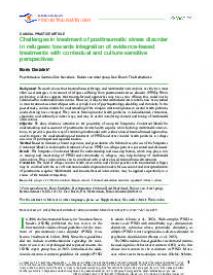Challenges in treatment of posttraumatic stress disorder
Background: Research shows that trauma-focused therapy and multimodal interventions are the two most
often used strategies in treatment of refugees suffering from posttraumatic stress disorder (PTSD). While
preliminary evidence suggests that trauma-focused approaches may have some efficacy, this could not be
established for multimodal interventions. However, it may be that multimodal interventions have been studied
in more treatment-resistant refugees with very high levels of psychopathology, disability, and chronicity. In the
past decades, various models for understanding of the complex relationship between mental health problems
and well-being have emerged. They aim at framing mental health problems in individualized, contextual,
epigenetic, and culturally sensitive ways, and may be useful in tailoring content and timing of multimodal
interventions.
Objective: To draw clinicians’ attention to the possibility of using the Integrative Contextual Model for
understanding and assessment of posttrauma mental health sequelae while tailoring multimodal interventions;
to present a possible way of combining multimodal with evidence-based trauma-focused approaches;
and to improve the understanding and treatment of PTSD and other mental health problems in refugee
survivors of prolonged and repeated trauma.
Method: Based on literature, clinical experience, and presentation of a fictional case, the use of the Integrative
Contextual Model in tailoring the treatment of severe PTSD in a refugee patient is presented and discussed.
Results: The Integrative Contextual Model for understanding and assessing factors, which may play a role
in causing and maintaining of PTSD and comorbidity in refugees, may help tailoring of multimodal
interventions. These interventions can be combined with evidence-based trauma-focused treatments.
Conclusion: The field of refugee mental health intervention and clinical practice with traumatized refugees
may be enriched with the use of contextual and developmental models for assessment and conceptualization
of posttrauma sequelae. Multimodal and trauma-focused interventions may be applied sequentially in a
course of the treatment trajectory.
Geachte bezoeker,
De informatie die u nu opvraagt, kan door psychotraumanet niet aan u worden getoond. Dit kan verschillende redenen hebben,
waarvan (bescherming van het) auteursrecht de meeste voorkomende is. Wanneer het mogelijk is om u door te verwijzen naar de bron
van deze informatie, dan ziet u hier onder een link naar die plek.
Als er geen link staat, kunt u contact opnemen met de bibliotheek,
die u verder op weg kan helpen.
Met vriendelijke groet,
Het psychotraumanet-team.
Reference:
Boris Drozdek | 2014
In: European Journal of Psychotraumatology, ISSN 2000-8066 | 6 | 1-8
http://www.ejpt.net/index.php/ejpt/article/view/24750
In: European Journal of Psychotraumatology, ISSN 2000-8066 | 6 | 1-8
http://www.ejpt.net/index.php/ejpt/article/view/24750
Keywords:
Comorbidity, Cultural Values, Interventions, PTSD (DSM-5), Refugees, Treatment, Violence


